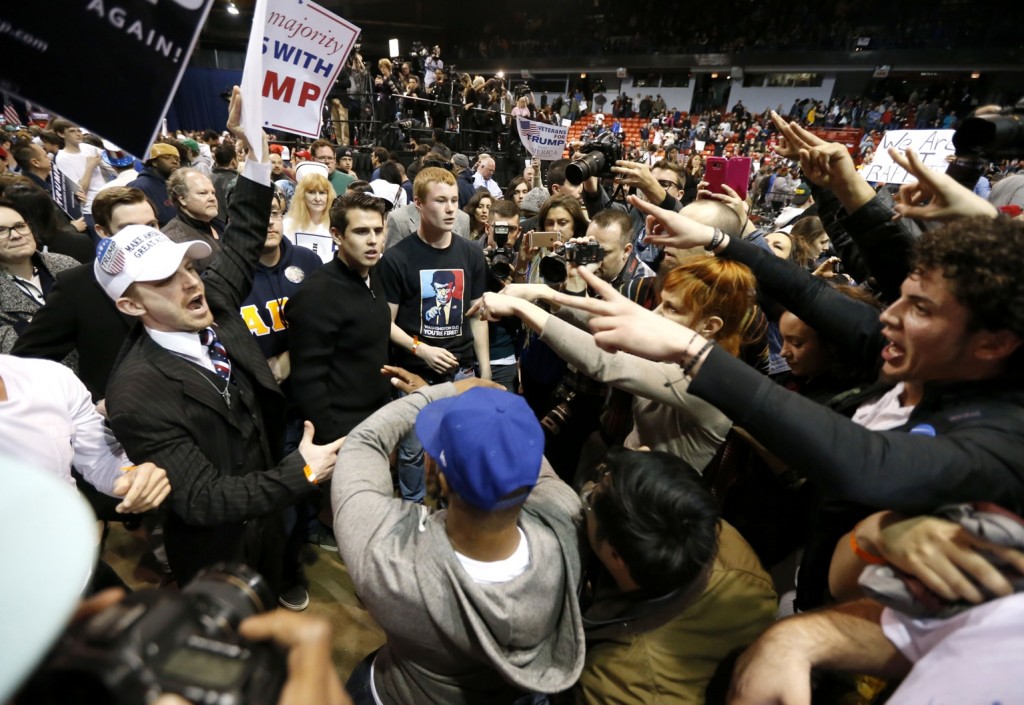- California Assembly OKs highest minimum wage in nation
- S. Korea unveils first graphic cigarette warnings
- US joins with South Korea, Japan in bid to deter North Korea
- LPGA golfer Chun In-gee finally back in action
- S. Korea won’t be top seed in final World Cup qualification round
- US men’s soccer misses 2nd straight Olympics
- US back on track in qualifying with 4-0 win over Guatemala
- High-intensity workout injuries spawn cottage industry
- CDC expands range of Zika mosquitoes into parts of Northeast
- Who knew? ‘The Walking Dead’ is helping families connect
Historians warn about use of anger, race in 2016 elections

Supporters of Republican presidential candidate Donald Trump, left, face off with protesters after a rally on the campus of the University of Illinois-Chicago was cancelled due to security concerns Friday, March 11, 2016, in Chicago. (AP Photo/Charles Rex Arbogast)
WASHINGTON (AP) — Fear of a changing America is fueling some of the anger playing out publicly around Donald Trump’s bid for the GOP presidential nomination, historians Ken Burns and Henry Louis Gates Jr. said Monday.
“We are in a retrograde moment right now in which the dog whistles of race are with us,” said Burns, an Academy Award-winning documentary filmmaker.
Trump is “speaking to a need and a deep set of fears within a large segment of the American community,” added Gates, a Harvard University scholar and host of a genealogy show on PBS. Those fears need to be assuaged, and policies formulated to meet the needs of those worried about their future, he said.
The comments came during a National Press Club luncheon during which the two men discussed the state of race relations in the United States and their upcoming television projects. “Jackie Robinson,” directed by Burns, along with Sarah Burns and David McMahon, will air on PBS in April, while Gates will host “Black America Since MLK: And Still I Rise” on PBS in the fall.
Trump, the Republican front-runner, has roiled the 2016 presidential race with his comments about Islam, Mexicans, the media and protesters at his rallies. Violence erupted last week when one of his supporters punched a protester being led from an event, and his Friday rally in Chicago was cancelled for fear of further violence.
Burns said some of Trump’s comments and actions — like forgetting that he had repudiated a Ku Klux Klan leader — “that is the wink wink dog whistle that signals to our unreconstructed brothers.”
“We’d like to believe in our better selves but in point of fact, a lot of us aren’t that,” Burns said.
Gates, who supports Democratic candidate Hillary Clinton, said he would advise her to “study” why some voters are so angry, and “why they are so prone to anti-black, anti-Islamic feelings, and why they want the wall up” at the U.S. border with Mexico.
Gates also said President Barack Obama underestimated the depth of animosity toward him. “I think he believed the narrative that a day of racial harmony had come,” he said. “I don’t think they anticipated the depth of American racism and how much had not changed because a black man had been elected president.”
Gates said even he was shocked at the amount of vitriol he received after an encounter with a police officer. Gates was arrested by a white officer who was investigating a burglary at Gates’ home in Massachusetts. The two men met at the White House for a beer with Obama, and are now friends, Gates said. But the flood of hate telephone calls, e-mails and letters stunned him.
“I was surprised by how organized hate can be,” he said.
















